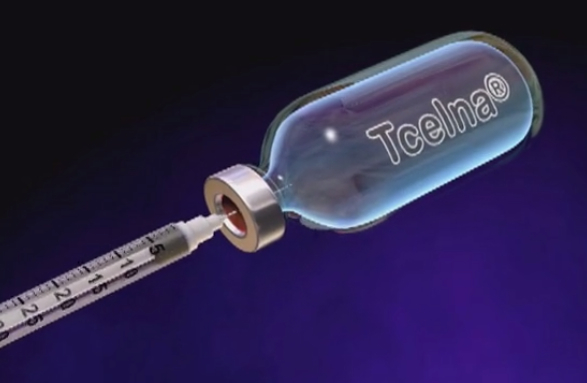SPMS Drug Developer Opexa Therapeutics To Receive $3M Payment from Merck Serono Under Amended Agreement

Opexa Therapeutics, Inc. a biopharmaceutical company headquartered in Woodlands, Texas, has announced the successful conclusion of negotiations amending its option and license agreement with Darmstadt, Germany based pharma multinational Merck’s “Merck Serono” division. Under terms of the revised agreement, Opexa will receive a $3 million payment to support an ongoing Phase 2b clinical study of Opexa’s personalized immunotherapy drug candidate Tcelna (imilecleucel-T), which the company has under development for treating patients with Secondary Progressive MS (SPMS), as well as preparation and planning for potential Phase 3 clinical studies.
Opexa’s focus on personalized immunotherapy is hoped to yield treatments for major illnesses, including multiple sclerosis (MS)and other autoimmune diseases such as neuromyelitis optica (NMO). These developmental therapies are based on Opexa’s proprietary T-cell technology. The company’s leading therapy candidate, Tcelna, is a personalized T-cell immunotherapy currently in a Phase IIb clinical development (the Abili-T trial) for the treatment of secondary progressive MS. Tcelna is derived from T-cells isolated from the patient’s own peripheral blood, expanded ex vivo, and reintroduced into the patients via subcutaneous injections — a process that triggers potent immune response against specific subsets of autoreactive T-cells known to attack the myelin sheathing that insulates and protects nerves.
 “Tremendous progress has been achieved in the treatment of multiple sclerosis over the past two decades but there remains a high unmet medical need for certain areas of the disease,” says Merck Executive Board Member CEO Healthcare Belén Garijo in an Opexa release. “Building on our strong heritage in multiple sclerosis, we will continue to focus our innovation efforts on areas where we can make a difference, such as secondary progressive multiple sclerosis where there are currently very limited therapeutic options. The additional support to Opexa to further develop Tcelna is another sign of our long-standing and continuing commitment to improving the lives of people living with multiple sclerosis.”
“Tremendous progress has been achieved in the treatment of multiple sclerosis over the past two decades but there remains a high unmet medical need for certain areas of the disease,” says Merck Executive Board Member CEO Healthcare Belén Garijo in an Opexa release. “Building on our strong heritage in multiple sclerosis, we will continue to focus our innovation efforts on areas where we can make a difference, such as secondary progressive multiple sclerosis where there are currently very limited therapeutic options. The additional support to Opexa to further develop Tcelna is another sign of our long-standing and continuing commitment to improving the lives of people living with multiple sclerosis.”
Tcelna (formerly known as Tovaxin) is a personalized T-cell immunotherapy for treatment of Secondary Progressive Multiple Sclerosis — specifically tailored to each patient’s immune response profile to myelin and designed to reduce the number and/or functional activity of specific subsets of myelin-reactive T-cells (MRTC) known to attack myelin.
Tcelna is manufactured using “ImmPath,” Opexa’s proprietary method for producing patient-specific T-cell immunotherapy, is described as encompassing collection of blood from the MS patient, isolation of peripheral blood mononuclear cells, generation of an autologous pool of myelin-reactive T-cells (MRTCs) raised against selected peptides from myelin basic protein (MBP), myelin oligodendrocyte glycoprotein (MOG) and proteolipid protein (PLP), and return of these expanded, irradiated T-cells back to the patient. These attenuated T-cells are then reintroduced into the patient via subcutaneous injection to trigger a therapeutic immune system response.
[adrotate group=”4″]
Tcelna is specifically tailored to each patient’s immune response profile to myelin and is designed to reduce the number and/or functional activity of specific subsets of myelin-reactive T-cells (MRTC) known to attack myelin. Tcelna is manufactured using ImmPath, Opexa’s proprietary method for the production of a patient-specific T-cell immunotherapy, which encompasses the collection of blood from the MS patient, isolation of peripheral blood mononuclear cells, generation of an autologous pool of myelin-reactive T-cells (MRTCs) raised against selected peptides from myelin basic protein (MBP), myelin oligodendrocyte glycoprotein (MOG) and proteolipid protein (PLP), and the return of these expanded, irradiated T-cells back to the patient. These attenuated T-cells are reintroduced into the patient via subcutaneous injection to trigger a therapeutic immune system response.
Tcelna has been granted Fast Track status by the U.S. Food and Drug Administration (FDA) for treating Secondary Progressive MS (SP-MS) based on the unmet need of the progressive indication and potential of Tcelna to benefit this patient population. Opexa notes that while patients with Secondary Progressive MS (SP-MS) represent approximately 50 percent of the total MS population, treatment options for SP-MS remain very limited. Currently, only one product is specifically approved for patients with SP-MS, and it carries a black box warning due to severe cardiotoxicity.
Opexa has also completed formal End of Phase II meetings with the FDA and has received support to move forward with the design of pivotal Phase III clinical trials in Relapsing Remitting MS (RR-MS). Opexa is currently conducting a Phase IIb clinical trial in SP-MS patients and continues to evaluate its plans in the RR-MS indication.
Tcelna’s unique mechanism of action combats demyelination of the central nervous system nerve fibers — the underlying cause of MS. Five clinical trials have been completed with Tcelna in 356 patients, many with multiple years of treatment, and Opexa believes Tcelna may possess a number of advantages compared to other MS therapies currently available or in development, including:
• Personalization – Tcelna, being a personalized autologous (based on the patient’s own blood) immunotherapy, is essentially custom-tailored to each individual patient’s specific myelin immunity. With Tcelna, each patient receives a newly personalized treatment on an annual basis based on their own unique epitope profile. Opexa’s research methodology is unique in that it evaluates 109 peptides across the three key myelin proteins to identify each patient’s set of dominant epitopes.
• Efficacy – Opexa says that in clinical trials conducted to date, Tcelna has been demonstrated an indication of reduction in the Annualized Relapse Rate (ARR) for patients with MS, slowing of disease progression, with evidence of improvement in disability of a number of MS patients, potentially suggesting neuroprotective benefit.
• Safety and Tolerability – Opexa believes that Tcelna treatment selectively targets and regulates pathogenic T-cell populations that are the underlying cause of MS. It is not a general immune suppressant and, accordingly, not associated with serious side effects frequently seen in patients receiving MS treatments that function by systemically suppressing the immune system. Opexa reports that in clinical trials conducted to date, Tcelna’s safety profile has remained superb.
• Improved Compliance – Currently available therapies are administered monthly and, in some cases, daily. A treatment regimen with Tcelna consists of only five subcutaneous injections annually, which Opexa believes may provide compliance benefits to both patients and physicians.
Opexa and Merck Serono inked their original option and license agreement for Tcelna in MS development and commercialization in February 2013, at which time Opexa received a $5 million upfront payment. Pursuant to that original agreement, Merck Serono has been granted an option to acquire an exclusive, worldwide (excluding Japan) license to market Opexa’s Tcelna therapy for treatment of MS — an option that may be exercised by Merck Serono prior to or upon completion of Opexa’s ongoing Phase 2b Abili-T trial of Tcelna in SPMS patients with. Top-line data from the Abili-T trial is expected to be available during the second half of 2016.
 “We are pleased with this show of support by Merck Serono towards Opexa’s novel and personalized immunotherapy,” comments Opexa’s President and Chief Executive Officer Neil K. Warma. “Our relationship with Merck Serono over the last two years has been productive and we are pleased to strengthen this relationship and expand our development efforts with them in the critical work we are doing in the field of multiple sclerosis. We continue to focus on the careful execution of our ongoing Abili-T trial in SPMS patients and look forward to our continued collaboration with Merck Serono.”
“We are pleased with this show of support by Merck Serono towards Opexa’s novel and personalized immunotherapy,” comments Opexa’s President and Chief Executive Officer Neil K. Warma. “Our relationship with Merck Serono over the last two years has been productive and we are pleased to strengthen this relationship and expand our development efforts with them in the critical work we are doing in the field of multiple sclerosis. We continue to focus on the careful execution of our ongoing Abili-T trial in SPMS patients and look forward to our continued collaboration with Merck Serono.”
Further details of the transaction are included in a Form 8-K filed by Opexa with the U.S. Securities and Exchange Commission.
Sources:
Opexa Therapeutics, Inc.
Merck Serono
Image Credits:
Opexa Therapeutics, Inc.
Merck Serono









